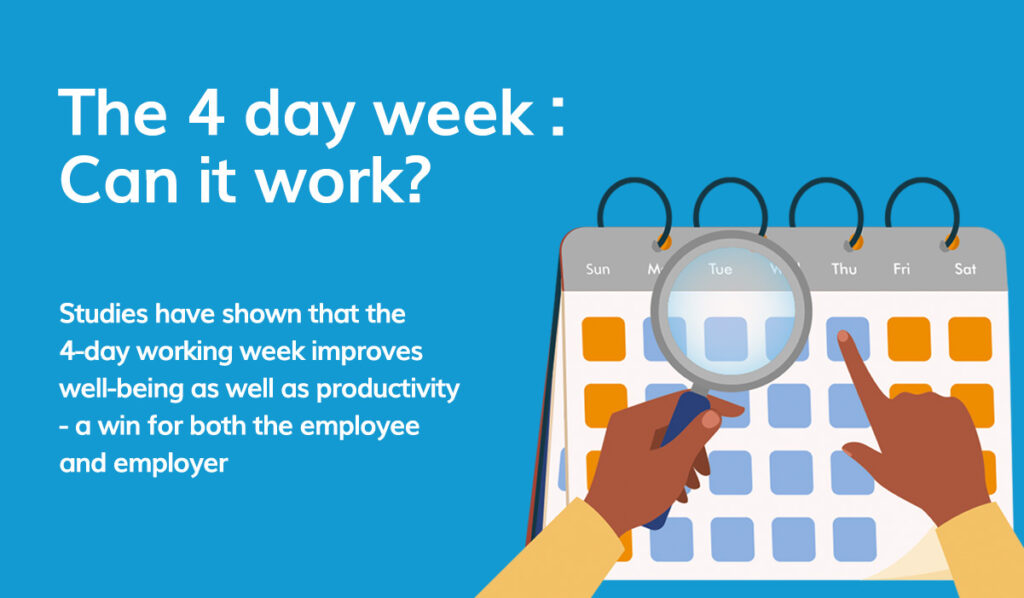*updated 03.02.22
We’ve heard legends and myths of the unicorn that is the four day working week here and there… but the possibility of it happening often seemed foreign and improbable… The Four Day Week… Dare we even entertain the notion of this possibility? Well, some might be happy to hear that it truly seems like the dawn of a new era and the 5 day working week has its days, as it were, numbered. So can this truly be the end of the weekend as we know it?

Spreading like wild fire…
The Irish campaign claims that a four-day week has a number of benefits including a better work-life balance which leads to more productivity overall. A similar trial also occurred in Iceland between 2015 and 2019 and was dubbed an “overwhelming success”, as stated by the director of research at Autonomy – Will Stronge. This resulted in 86% of the Icelandic workforce moving to a shorter work week for the same pay or eventually transitioning to it. Similarly, FMCG giant Unilever in New Zealand has also given the four day week a chance by giving employees the chance to reduce their hours by 20% without taking a cut in their pay.
More recently, workers in the United Kingdom have been offered the chance to work four-day weeks with no loss of earnings. A six-month pilot programme is recruiting companies to study the impact of shorter working hours on businesses’ productivity and the well-being of their workers, as well as the impact on the environment and gender equality.
The governments of Spain and Scotland have also launched their own trials, whilst the government of Finland is encouraging companies to switch to this model.
…and locally too
Locally, Casumo introduced Free Friday – which essentially gives employees Fridays off in the month of August. Similarly, Switch – Digital & Brand are currently trialling the 4 day week. Many companies have quoted the changes in perspective that the pandemic brought with it. Everyone saw the benefits of working from home. Work still got done and freed up time from our daily commutes to and from work. Essentially, we freed up chore time from our weekends, felt more relaxed and found more time to spend with our families.
Work smarter not harder?
It must be said however, that employees will still be expected to produce the same, if not better, results. The 4 day working week is not reducing employees work, but their time… so is this actually adding to the pressure? Employers will move away from measuring employee performance based on the amount of time spent at work and focus only on productivity. Most countries’ trials are based on the model is known as the 100: 80: 100, where employees are required to do 100% of their work in 80% of their time for 100% of their wages. The truth is, with all the technology we have at our finger tips, we can be more efficient.
So, taking into account the global efforts in introducing the 4-day week…how beneficial is it and what are its downsides?
The Pros
The 5-day week model is the product of the Industrial Revolution in the 19th century- when people got out of bed, went to work, did their jobs and then went home. However, with the advances in technology longer hours at work do not necessarily mean more productivity. Microsoft’s Japan offices also trialled it and quantified a 40% increase in productivity all round. In this case however, the day was taken as paid leave.
Reduced costs
Perhaps the most obvious benefit is the all round reduced cost – people have to commute less (therefore less fuel costs and vehicle wear and tear), reduced office running costs, reduced lunch and coffee costs.
Reduced carbon footprint
When we’re travelling less to and from work, switching on our laptops less and spending more time out of the office we are reducing the carbon footprint. This also means large office buildings are only in use 4 days out of 7.
Better work-life balance
You won’t hear many complaining about having a 3-day weekend. People will have more time to spend on their hobbies, their families, a weekend escape. This results in an overall happier workforce and by extension increased loyalty to the company.
Improved mental and overall health
This goes hand in hand with our previous point. A longer weekend break means more time to refresh and reground before a new work week. A 3 day weekend also means more time to recover at home if you’re feeling out of sorts. Between 2015 and 2017 Sweden tested a shorter work week. Nurses at a care home worked for six hours for 5 days a week. Nurses called in sick less, reported better overall health and organised 85% more activities for patients in their care.
The Cons
As with anything else there are downsides to consider. Here are a few:
Customer Satisfaction
With offices opening for less time in the week, in the trials, customers seeking help found the office doors closed and were left waiting for a longer period to be attended to.
This can be handled by keeping customer care representatives working on a roster, to keep offices open for longer. Another option would be to improve chat bots that will help in handling frequently asked questions and direct customers to a solution.
Some may put in their usual hours anyway
It is not uncommon that some employees end up working longer than their stipulated hours – simply because some jobs take time. It will also mean that it will affect workers who usually put in overtime. Overtime policies may need to change as companies may be already paying for an “extra day off”.
Requires time to adapt to a new reality
Shorter working hours can stress those employees who are in a pinch with tough deadlines. While the 4-day aims to make us work more efficiently and smarter, it will require time for employees (as well as companies) to adjust to a new schedule effectively.
Conclusion
Working has been part of our lives, since the dawn of time. Through work we achieve our goals, get personal satisfaction and grow. Changes like the 4-day week will change how we view our working lives and pave the way for a healthier and more balanced way of life. In fact, it is an excellent way, especially in the wake of the great resignation, to retain and attract new talent.
What do you think about the implementation of a 4-day week? Would you prefer it to a normal work week? Let us know!
View the latest KMP blog posts here.

